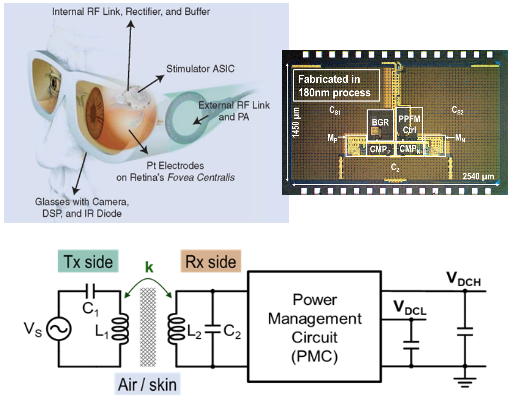MSc thesis project proposal
[2024] Energy-Efficient Circuits and Systems for Wireless Power Transfer
Wireless power transfer (WPT) is widely used for powering biomedical implantable devices. In a typical biomedical WPT system, a high power conversion efficiency (PCE) is critical to reduce heat generation that can be absorbed by human tissue. On the other hand, a compact system is always desired for bioimplants. Thus, the regulating rectifier becomes a promising solution as a single-stage wireless power receiver performing voltage rectification and regulation simultaneously. It avoids cascaded power losses and reduces the use of bulky power components. Recent research on WPT has shown good energy efficiency and simultaneous data transfer [1]. However, the current designs still suffer from low transmitted power levels, insufficient end-to-end power efficiency, limited distance range, poor regulation performance, and low frequency. [2] [3]
In this project, we are going to design a highly efficient WPT system with an integrated power transmitter an ASIC, and/or a power receiver ASIC.
[1] J. Lin, Y. Lu, C. Zhan, and R. P. Martins, "A Single-Stage Dual-Output Regulating Rectifier With Hysteretic Current-Wave Modulation," IEEE Journal of Solid-State Circuits, vol. 56, no. 9, pp. 2770-2780, 2021, doi: 10.1109/JSSC.2021.3071221.
[2] T. Lu and S. Du, "A Single-Stage Regulating Voltage-Doubling Rectifier for Wireless Power Transfer," IEEE Solid-State Circuits Letters, vol. 6, pp. 29-32, 2023, doi: 10.1109/LSSC.2023.3239691.
[3] T. Lu, Z. Y. Chang, J. Jiang, K. Makinwa, and S. Du, "A 13.56MHz Fully Integrated 91.8% Efficiency Single-Stage Dual-Output Regulating Voltage Doubler for Biomedical Wireless Power Transfer," in 2023 IEEE Custom Integrated Circuits Conference (CICC), 23-26 April 2023 2023, pp. 1-2, doi: 10.1109/CICC57935.2023.10121186.
Assignment
1. Literature review of WPT topologies and associated power management circuits.
2. Design and tape out the proposed ASIC for the WPT system.
Requirements
You should be familiar with analog IC design and Cadence environment. If you are interested, please send the following documents to Sijun Du at email: Sijun.Du@tudelft.nl
- Your up-to-date CV
- BSc transcripts
- MSc grades (obtained to date)
Suggested courses to appear in your IEP:
- Analog Circuit Design Fundamentals
- Measurement and Instrumentation
- Analog CMOS Design 1 and 2
- Digital IC Design 1 and 2
- Analog Integrated Circuit Design
Not a must in your IEP, but you are encouraged to learn some course materials at least:
- Nyquist-Rate Data Converters
- Power conversion techniques in CMOS technology (Only the SMPC and SCPC parts)
- Semiconductor Device Physics
Contact
dr. Sijun Du
Electronic Instrumentation Group
Department of Microelectronics
Last modified: 2024-06-11
